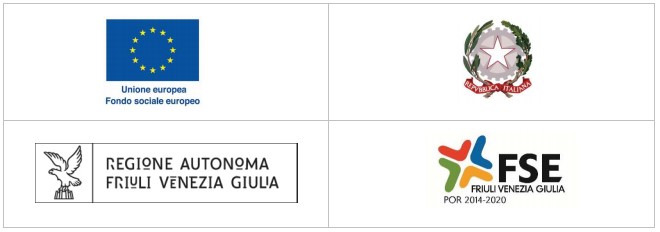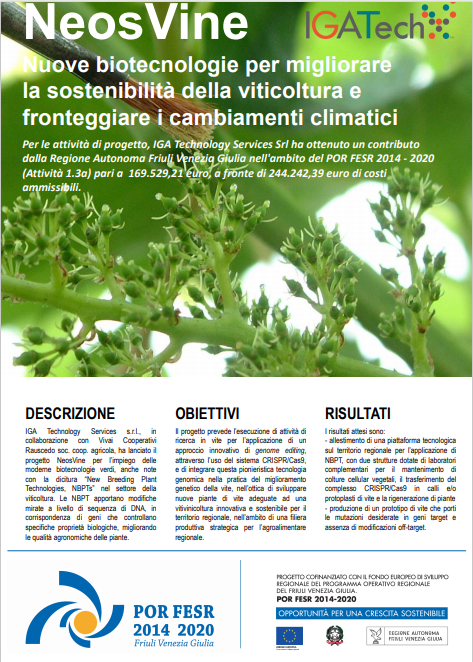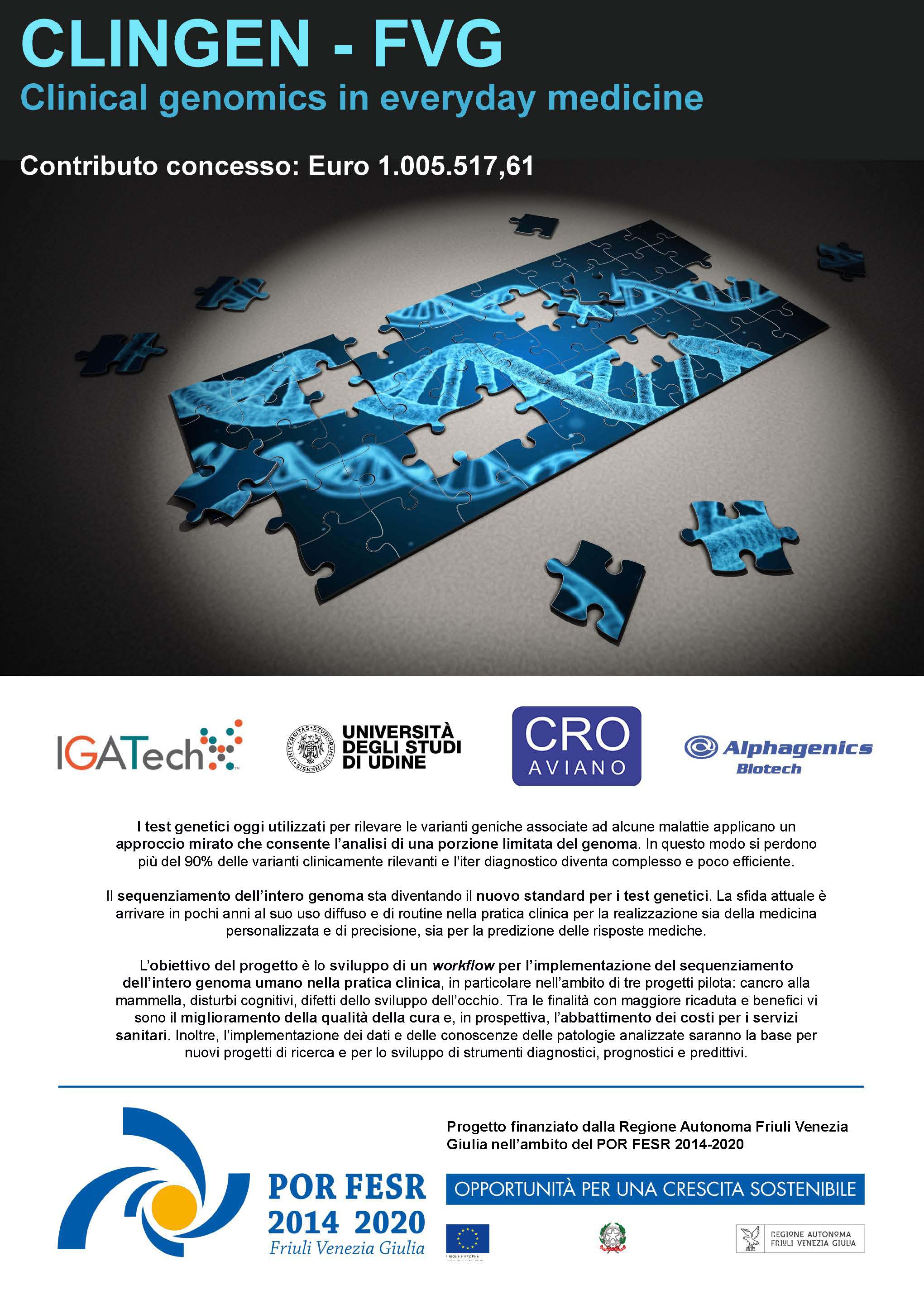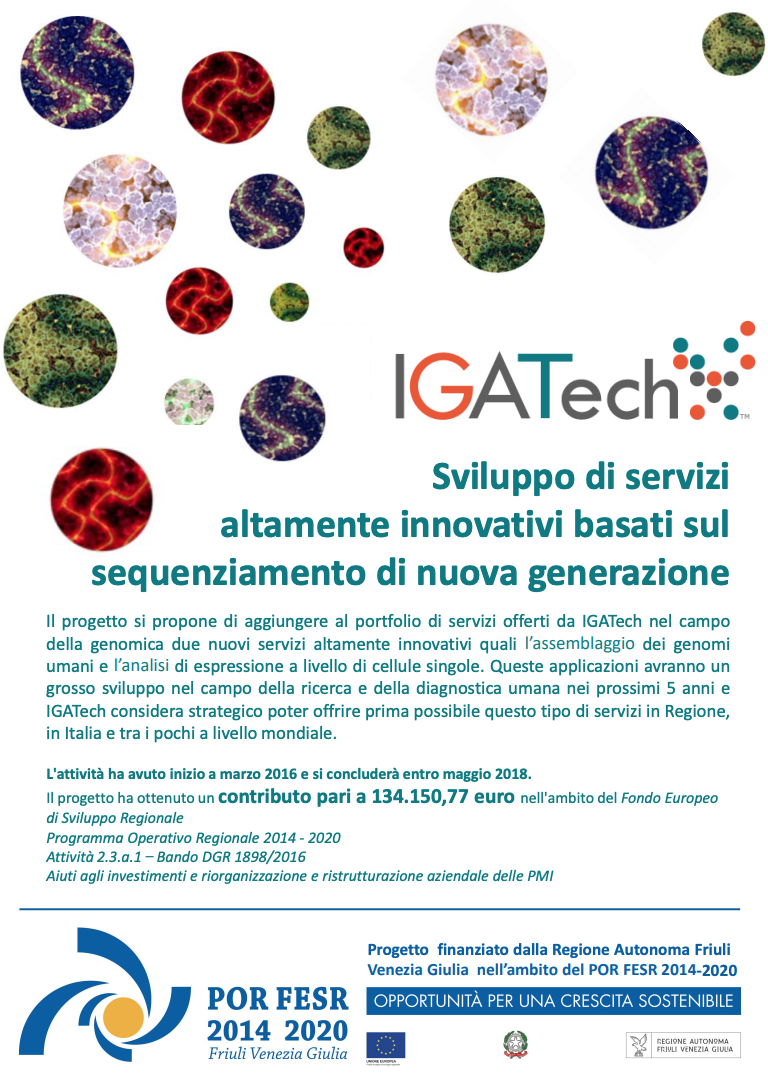An affordable and scalable genomic platform for biomarker monitoring in cancer treatment GENOME PLATFORM
The project involves the development of an innovative methodology for the analysis of liquid and tissue biopsies through DNA sequencing technology coupled with automated processes.
We aim to generate a platform that makes precision medicine accessible through a strong cost reduction. Research activities are developed in collaboration with the Aviano Oncological Reference Center (IRCCS CRO) and University of Udine.
The project activities started in March 2022 and will end by September 2023.
The total cost of the project is about 579.458,42 €. The project is financed by Region Friuli Venezia Giulia - PR FESR 2021-2027 with a contribution of 211.310,02 €.
CUP code – D29J23000010007

Business Intelligence - Innovation in sales organization, customer care and management control (2021-2022)
Project financed by the Regione Autonoma Friuli Venezia Giulia under the POR FESR 2014-2020.
This project aims to transform the sales organization and management control by using a fully digitized, integrated and customized process and by introducing the Business intelligence approach in the field of reseqrech services.
The development implies the use of an integrated ecosystem of software, such as the services for sales management (CRM) and for the administrative accounting management (ERP).
The activity started in December 2020 and will end by February 2022.
The total amount of the project is 95.970 € and has obtained a contribution of € 57.582,00 from the Regione Autonoma Friuli Venezia Giulia as part of the Program POR FESR 2014-2020.
Activity 1.2.a. - Line of action 1.2.a.1 for the granting of incentives to enterprises for process and organisational innovation activities - areas of agrifood specialisation, strategic production chains, maritime technologies and smart health - call for proposals 2020.
CUP code D29J21005290007

Genomics@Home (2020)
Project financed by the Regione Autonoma Friuli Venezia Giulia under the
European Social Fund – Operational Program 2014/2020.
This project aims to allow employees to work safely, by using smart-working as much as possible, to cope with the CoVid-19 pandemic.
To achieve this goal it is necessary to:
- adopt new organizational models and strategies for the coordination of remote working;
- introduce new IT tools (video conferencing technology platforms, data sharing software, etc.)
- allow remote access to the company’s IT infrastructure, ensuring the highest standards of data security;
- provide appropriate training for employees.

The activity will start in September 2020 and will end by February 2021.
The project has obtained a contribution of € 8.368,80 from the Regione Autonoma Friuli Venezia Giulia as part of:
European Social Fund – Operational Programm 2014/2020
Periodic scheduling of the activities – PPO – Year 2020
Detailed program 101/20 – To support the adoption of innovative work organization models, by developing enterprise plans and introducing the proper IT tools, by adopting smart-working. COVID19 - emergency.
DESKTOP VIRTUALIZATION - simplifying IT management (2020-2021)
Project financed by the Regione Autonoma Friuli Venezia Giulia under the POR FESR 2014-2020.
This project aims to simplify the processes of IT management, to standardize access to applications, to avoid machine downtime and data loss, to secure the network and to optimize the disaster recovery system.

The activity started in July 2020 and will end by June 2021.
The project has obtained a contribution of € 24.980,00 from the Regione Autonoma Friuli Venezia Giulia as part of the POR FESR 2014-2020
Axis II – Promote SMES competitiveness
Activity 2.3.B.1 BIS “INVESTMENT AID AND REORGANIZATION AND CORPORATE RESTRUCTURING OF SMES."
Call DGR 2639/2017
CUP code C29J20000190007
NeosVine: New biotechnologies to improve the sustainability of viticulture and tackle climate change (2018-2020)
NeosVine is a collaborative project between two local enterprises, which is funded by the Regione Autonoma Friuli Venezia Giulia in the frame of the POR FESR 2014-2020

IGATech has received this cofunding for establishing a facility for tissue culture and genome editing, with the aim of applying new breeding technologies to crop improvement. The first case-study of NeosVine is addressed to the biolistic delivery of a DNA-free CRISPR-Cas9 editing toolkit, as a ribonucleoproteic complex, into grape embryogenic tissues for inducing targeted gene silencing.
IGATech will cooperate in NeosVine with the project partner Vivai Cooperativi Rauscedo, a leading grape nursery. Both companies are strongly committed to invest in Research & Development in the sector of grape green biotechnologies with the aim of supporting the local wine industry with improved grape stocks. NeosVine will lay the ground for improving historical grape varieties for resistance and resilience traits and for contributing to a sustainable viticulture.
For the project activities IGA Technology Services Srl obtained a contribution from the Autonomous Region of Friuli Venezia Giulia under the POR FESR 2014 - 2020 (Activity 1.3a); The amount of eligible cost: 244,242.39 EUR. while the grant recieved is 169,529.21 EUR.
Per le attività di progetto IGA Technology Services Srl ha ottenuto un contributo dalla Regione Autonoma Friuli Venezia Giulia nell'ambito del POR FESR 2014 - 2020 (Attività 1.3a); L'importo della spesa ammessa: 244.242,39. Il contributo concesso è pari a 169.529,21
The activities started in June 2018 and are expected to be completed in 21 months. Activities 1.3.a - DGR n. 1232/2017. Pratica n. 38277/R&S/2017

EPIDIVERSE (Horizon 2020, 2017-2021)
https:/nioo.knaw.nl/en/epidiverse
EpiDiverse - Epigenetic Diversity in Ecology - is an innovative Marie Skłodowska-Curie training network for the study of epigenetic variation in wild plant species
The project is funded by the EU Horizon 2020 program and involves 12 partners from universities, non-profit organizations and industries located in the Netherlands, Germany, France, Spain, Czech Republic, Italy and Austria.
Within the project, IGA TECHNOLOGY SERVICES will host two early stage researchers, who will simultaneously take part in the joint research PhD course in the field of molecular biology (Jumbo) at the International School for Advanced Studies (SISSA) in Trieste.
GenTree (Horizon 2020, 2016-2020)
The goal of GenTree is to provide the European forestry sector with better knowledge, methods and tools for optimising the management and sustainable use of forest genetic resources (FGR) in Europe in the context of climate change and continuously evolving demands for forest products and services.
To reach its goal, GenTree will make scientific, technological and implementation breakthroughs in:
- designing innovative strategies for dynamic conservation of FGR in European forests
- broadening the range of FGR used by European breeding programmes
- preparing new forest management scenarios and policy frameworks fully integrating genetic conservation and breeding aspects, to adapt forests and forestry to changing environmental conditions and societal demands.
GenTree focuses on economically and ecologically important tree species in Europe, growing in a wide range of habitats and covering different societal uses and values.
Clingen - clinical genomes in everyday practice (2017-2019)
Clingen is a project financed by the Regione Autonoma Friuli Venezia Giulia under the POR FESR 2014-2020.
https://www.youtube.com/watch?v=UJ0FSjlyUkQ
The genetic tests currently used to detect gene variants associated with certain diseases apply a targeted approach that allows the analysis of a limited portion of the genome. In this way, more than 90% of the clinically relevant variations are lost, which makes the diagnostic process complex and inefficient.

The sequencing of the entire genome is becoming the new standard for genetic testing. The current challenge is to widespread its use in clinical practice for both personalized and precision medicine and for more efficient patient management.
The aim of the project is to develop a workflow for the implementation of the sequencing of the entire human genome in clinical practice through three pilot projects: breast cancer, cognitive disorders, defects in eye development.
Among the goals is the improvement of the quality of care and, in the prospect, the reduction of costs for health services. In addition, the implementation of data and knowledge of the pathologies analyzed will be the basis for new research projects and for the development of new diagnostic, prognostic and predictive tools.

Development of Highly Innovative Services based on NGS (2016-2018)
Project is financed by the Regione Autonoma Friuli Venezia Giulia under the POR FESR 2014-2020.
The aim of the project is to expand the portfolio of IGATech genomics services by developing two new, highly innovative products: the assembly of personal genomes and the expression analysis at the single cell level.

These two applications will have a major impact in the field of human research and diagnostics over the next 5 years and our endeavor is to become one of the leaders in these fields not only at the regional and Italian level but also worldwide.
The activity started in March 2016 and will end by May 2018.
The project has obtained a contribution of € 134,150.77 from the Regione Autonoma Friuli Venezia Giulia as part of the POR FESR 2014-2020
Activities 2.3.a.1 - Call for DGR 1898/2016
Aid for investments and reorganization and corporate restructuring of SMEs

WatBio (European Framework 7, 2012-2017)
The overall purpose of WATBIO is to increase the efficiency of plant breeding to provide improved biomass crops suitable for growing on drought-stressed marginal lands. WATBIO is developing improved plant varieties suited to water-stressed environments in three non-food biomass crop species: poplar (Populus spp.); a C4 grass (Miscanthus spp.) and arundo (Arundo donax L.) which is a C3 grass of considerable potential but as yet, hardly developed.
WATBIO supports breeding with advanced molecular genetics, particularly using next generation sequencing approaches (to generate and measure allelic diversity) and molecular phenotyping. RNA-Seq will be used for the first time in two of the three species to increase the efficiency of their breeding programmes.
Developing drought tolerant crops is difficult. There is a trade-off between protecting soil water and maximising crop growth. The optimum strategy for biomass production and water conservation varies depending on the species and region. For example, in miscanthus, the ability to survive intense drought is important, and is likely to become more important with climate change. In all species, the ability to grow relatively well under mild stress is important in water stressed environments. Specifically, WATBIO aims to:
- provide a better understanding of the fundamental mechanisms determining drought tolerance;
- provide a database of ‘water stress response’ trait information with a modelling capability;
- support innovative molecular breeding/genetic optimisation;
- deploy GM technologies to test importance of single genes for drought tolerance;
- assess the performance of the new crop plants in the field;
- train multidisciplinary non-food crop bioscientists and technologists;
- maximise the impact of the project by enabling users shape the project and through commercial exploitation and dissemination; and develop and exploit synergy with other relevant research projects.
DISCO (European Framework 7, 2013-2017)
Plant natural products have been utilized by human civilization for millennia, providing vital medicines and essential dietary components. More recently bioactive compounds from plant sources have been used in cosmetics, as health supplements and are important components of feedstuffs. Despite significant investments new activities and new sustainable biosources are required to reduce or eliminate chemical refining and thus environmental impact.
Against this backdrop, DISCO aims to understand plant biosynthetic pathways involved in the formation of high-value plant products and develop new tools for metabolic engineering and molecular breeding to generate new biosources of bioactive and industrial phytochemicals. DISCO is funded by the European Commission under the Seventh Framework Programme for Research and Innovation (FP7) with a total budget of 6.5 million euros.
D.NAMICA - Platform for molecular and personalized medicine (2012-2015)
Video: https://www.youtube.com/watch?v=GPY_YULXJ3g
D.NAMICA aims to develop a prototype platform for integration and implementation of NGS genomics data into routine clinical care by providing clinical investigators with the software tools necessary to collect and manage clinical “-omics” data, thus developing a clinical-biomolecular electronic medical record that supports clinicians in providing personalized care.
Project implements three pilot projects to help research activities to better understand the genetic characteristics of patients and their answers to personalized treatment in the following sectors: cardiology (DCM - dilatative cardiomyopathy), oncology (HCC - Hepatocellular carcinoma) and neurodegenerative diseases (SMA - Spinal muscular atrophy).
D.NAMICA is cofunded by ERDF - European Regional Development Fund - Friuli Venezia Giulia Region Operational Programme 2007 - 2013.
eHealth2patient – E-Health platform for molecular medicine and personalized patient care (2015-2018)
Genomics, transcriptomics and clinical proteomics: observing the human body as a dynamic system of molecular interactions.
The goal of the project is to develop a model that integrates clinical and biomolecular data in order to support medical staff in personalized patient care. More accurate identification of biological response patterns in different states of disease in the individual patient opens new perspectives of applied research for more personalized therapy. For this we need to create an accurate informatics model that integrates clinical information (including the effect of drugs) with ‘omics’ data in order to capture dynamics of the system transitioning from health to disease and vice versa. From a clinical point of view, an implementation of such model has a great potential in management and treatment of human health.
Project is cofounded by Italian Ministry of Education, University and Research
Metagenomica – NGS-based diagnostic assay for the identification of grape microbial communities (2016)
The introduction of Next-Gen Sequencing allowed large scale analysis of microbial communities and revolutionized microbial metagenomics permitting more sensitive description of diverse communities.
The goal of the project is the development of new rapid and highly sensitive tests for the simultaneous diagnosis of pathogenic microorganisms (fungi/viruses/bacteria) at low cost, in grapevine and other species of agricultural interest, such as citrus and olive. An accurate and early genomic monitoring gives a possibility of targeted interventions, preventing the loss of plants and the spread of disease. The project is developed in partnership with Vivai Cooperativi Rauscedo, worldwide leader in the grapevine nursery business.
Project is cofunded by FVG Regional Funds for SME (PAR FSC Programme 2007-2013)
BioWine - multidisciplinary approach to improve the quality of wine production (2012 – 2013)
The project aims to enhance the Sicilian regional viticulture and wine production through the transcriptome study of at least two cultivars of V. vinifera, Nero d'Avola and Nerello Mascalese. We intend to analyze how different environments change grapevine expression profiles in an attempt to promote organoleptic expression and increase nutraceutical characteristics of the final product.
Obtained data will be shared and integrated with those produced by other international initiatives.
Project is cofunded by ERDF - European Regional Development Fund - Sicilia Region Operational Programme 2007 - 2013
IT-CitrusGenomics - functional genomics, genetic improvement and innovation for the development of the citrus industry products (2010 – 2013)
Demands of sustainable and environmentally friendly agriculture, as well as the challenges posed by global competition urge national citrus cultivation to change traditional agricultural practices.
Taking this into account the project aims to resequence the three primary species of citrus fruits (citron, pummelo and mandarin) and at least 25 genotypes of citrus accessions with phenotypic differences related to the color, the size of the fruit, the seedless, the vesting period and the anthocyanin content. In addition, we intend to identify polymorphisms for the varietal characterization and traceability in 400 accessions of citrus.
Project is cofunded by Italian Ministry of Education, University and Research and European Social Fund within the National Operational Programme